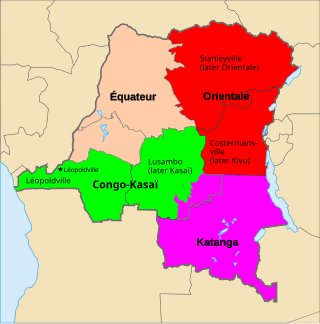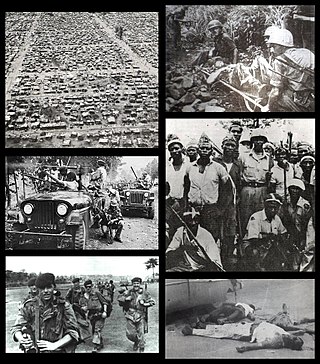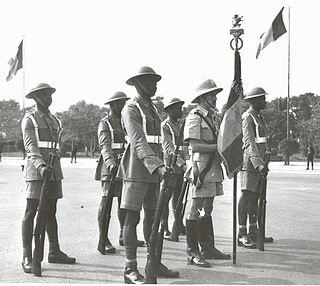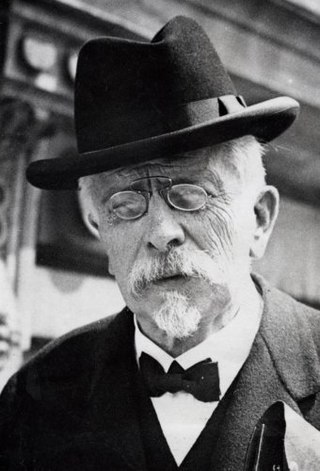| |||||
| Decades: | |||||
|---|---|---|---|---|---|
The following lists events that happened during 1957 in the Belgian Congo .
| |||||
| Decades: | |||||
|---|---|---|---|---|---|
The following lists events that happened during 1957 in the Belgian Congo .
| Date | Event |
|---|---|
| 12 February | Adolphe Muzito, future prime minister of the Democratic Republic of the Congo, is born in Gungu, Kwilu Province. |
| December | Local elections are held for the first time. [1] |

Leopold II was the second King of the Belgians from 1865 to 1909, and the founder and sole owner of the Congo Free State from 1885 to 1908.

The Belgian Congo was a Belgian colony in Central Africa from 1908 until independence in 1960 and became the Republic of the Congo (Léopoldville). The former colony adopted its present name, the Democratic Republic of the Congo (DRC), in 1964.

The Congo Free State, also known as the Independent State of the Congo, was a large state and absolute monarchy in Central Africa from 1885 to 1908. It was privately owned by King Leopold II, the constitutional monarch of the Kingdom of Belgium. In legal terms, the two separate nations were in a "personal union". The Congo Free State was not a part of, nor did it belong to Belgium. Leopold was able to seize the region by convincing other European states at the Berlin Conference on Africa that he was involved in humanitarian and philanthropic work and would not tax trade. Via the International Association of the Congo, he was able to lay claim to most of the Congo Basin. On 29 May 1885, after the closure of the Berlin Conference, the king announced that he planned to name his possessions "the Congo Free State", an appellation which was not yet used at the Berlin Conference and which officially replaced "International Association of the Congo" on 1 August 1885. The Free State was privately controlled by Leopold from Brussels; he never went there.

Équateur was a province in the northwest of the Belgian Congo and the successor Republic of the Congo, now known as Democratic Republic of the Congo. It had its origins in the Équateur District of the Congo Free State, the private property of King Leopold II of Belgium. It was upgraded to the status of a province in 1917. Between 1933 and 1947 it was named Coquilhatville. In 1962 it was divided into three smaller provinces, but there were recombined in 1966. Équateur was one of the eleven provinces of the Democratic Republic of the Congo until 2015, when it was split into the new, smaller Équateur province, as well as the Tshuapa, Mongala, Nord-Ubangi and Sud-Ubangi provinces.

The national flag of the Democratic Republic of the Congo is a sky blue flag, adorned with a yellow star in the upper left canton and cut diagonally by a red stripe with a yellow fimbriation. It was adopted on 18 February 2006. A new constitution, ratified in December 2005 and which came into effect in February 2006, promoted a return to a flag similar to that flown between 1963 and 1971, with a change from a royal blue to sky blue background. Blue represents peace. Red stands for "the blood of the country's martyrs", yellow the country's wealth; and the star symbol the future for the country. It is one of the few national flags incorporating a diagonal line, with other examples including Tanzania, Namibia, Trinidad and Tobago, and Brunei.

The national emblem of the Democratic Republic of the Congo has changed several times since 1997. The current one was introduced in 2006 and depicts a leopard head, surrounded by an elephant tusk to the left and a spear to the right. Below are the three words which make up the national motto: Justice, Paix, Travail. It was adopted on 18 February 2006 by President Joseph Kabila.
The Congolese franc is the currency of the Democratic Republic of the Congo. It is subdivided into 100 centimes. However, centimes no longer have a practical value and are no longer used. In April 2022, 2,000 francs was equivalent to US$1.

The Congo Crisis was a period of political upheaval and conflict between 1960 and 1965 in the Republic of the Congo. The crisis began almost immediately after the Congo became independent from Belgium and ended, unofficially, with the entire country under the rule of Joseph-Désiré Mobutu. Constituting a series of civil wars, the Congo Crisis was also a proxy conflict in the Cold War, in which the Soviet Union and the United States supported opposing factions. Around 100,000 people are believed to have been killed during the crisis.

The Force Publique was a gendarmerie and military force in what is now the Democratic Republic of the Congo from 1885, through the period of Belgian colonial rule. The FP was retitled as the Congolese National Army or ANC in July 1960 after independence.
The Congo Reform Association (CRA) was a political and humanitarian activist group that sought to promote reform of the Congo Free State, a private territory in Central Africa under the absolute sovereignty of King Leopold II. Active from 1904 to 1913, the association formed in opposition to the institutionalised practices of Congo Free State's 'rubber policy', which encouraged the need to minimise expenditure and maximise profit with no political constraints – fostering a system of coercion and terror unparalleled in contemporary colonial Africa. The group carried out a global publicity campaign across the Western world, using a range of strategies including displays of atrocity photographs; public seminars; mass rallies; celebrity endorsements; and extensive press coverage to lobby the Great Powers into pressuring reform in the Congo. The association partially achieved its aims in 1908 with the Belgian government's annexation of the Congo Free State and continued to promote reform until disbanding in 1913.

Belgium controlled several territories and concessions during the colonial era, principally the Belgian Congo from 1908 to 1960, Ruanda-Urundi from 1922 to 1962, and Lado Enclave from 1884 to 1910. It also had small concessions in Guatemala (1843–1854) and Belgian concession of Tianjin in China (1902–1931) and was a co-administrator of the Tangier International Zone in Morocco.

Article 2 of the Constitution of the Democratic Republic of the Congo divides the country into the capital city of Kinshasa and 25 named provinces. It also gives the capital the status of a province. Therefore, in many contexts Kinshasa is regarded as the 26th province.

The Republic of the Congo was a sovereign state in Central Africa, created with the independence of the Belgian Congo in 1960. From 1960 to 1966, the country was also known as Congo-Léopoldville to distinguish it from its northwestern neighbor, which is also called the Republic of the Congo, alternatively known as "Congo-Brazzaville". In 1964, the state's official name was changed to the Democratic Republic of the Congo, but the two countries continued to be distinguished by their capitals; with the renaming of Léopoldville as Kinshasa in 1966, it became also known as Congo-Kinshasa. After Joseph Désiré Mobutu, commander-in-chief of the national army, seized control of the government in 1965, the Democratic Republic of the Congo became the Republic of Zaire in 1971. It would again become the Democratic Republic of the Congo in 1997. The period between 1960 and 1964 is referred to as the First Congolese Republic.

The Belgian Minister of the Colonies was a Belgian parliamentarian who was responsible for the territories of the colonial empire in Central Africa from 1908 to 1962, comprising the colony of the Belgian Congo (1908–60) and the international mandate of Ruanda-Urundi (1916–62). The exact title was changed on several occasions.

Belgium–Congo relations refers to relations between the Kingdom of Belgium and the Democratic Republic of the Congo. The relationship started with the exploration of the Congo river by Henry Morton Stanley.

The history of the Jews in the Democratic Republic of the Congo can be traced back to 1907, when the first Jewish immigrants began to arrive in the country. The current Jewish Congolese population is mostly of Sephardi background.
The following lists events that happened during 1908 in the Kingdom of Belgium.
Relations between the Congo Free State and the United States began after recognition between the two states in 1885 when the Congo Free State was established. After Belgium under Leopold II annexed the Congo Free State in 1908, later becoming Belgian Congo, relations ceased between the two nations.